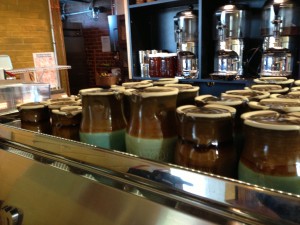“Where Are We Going”
Luke 4:1-13
A Sermon for Pilgrim United Church of Christ, Durham NC
February 17, 2013
In these weeks since Epiphany, we have journeyed through Jesus’ baptism, his first miracle, and his sermon in his hometown of Nazareth. This morning we come to the story of the Temptations.
(Jeremy, our accompanist, played the introduction to “My Girl” and I sang the first line)
Well — not those Temptations.
These are a little less rhythmic and a little more ominous. As Luke tells us, Jesus was led into the wilderness to fast for forty days. The Lectionary passages for this week makes the connection between Jesus’ time in the wilderness and the forty years of wandering by the Hebrew people after they came out of Egypt trying to come to terms with what it meant to be the people of God. His time in the desert also shapes our forty days of Lent: days intended to sharpen our focus, our faith, our faithfulness, and our direction as we move first to the Cross and then to the Resurrection.
As Luke tells the story, at the end of Jesus’ time of fasting, the devil showed up to tempt him. As we might imagine, Jesus was hungry, lonely, and tired. (I say the last one because I don’t imagine one sleeps well without food.) He was preparing to reenter the world and do what he came to do. The tempter even has Bible verses to shore up his argument and challenges Jesus to turn the stones into bread so he could satisfy his hunger immediately, to take power over the world by acquiescing to the world’s definition of power, and to jump off a tall building to prove the angels would catch him. After each offer, Jesus responded with a rather succinct and determined, “No.”
Reading through commentaries this week reminded me of how many people — from Dostoevsky’s Grand Inquisitor down to a college friend whose sermon I found online — have written trying to unpack the meaning of this story. Kyle Childress is my college and seminary friend. He wrote about an encounter with an old pastor who had preached at his ordination. After the service, Kyle walked him to the car. He writes:
He laid his Bible on the roof of the car as he opened the door and turned to me, “There are two more things you need to know about being a pastor. You’ll need to learn to say ‘No!’ and ‘Hell no!’” With that parting word he got in his car and drove away.
Kyle continues:
Luke tells us that immediately after his baptism Jesus goes into the wilderness and learns to say, “No!” He said “Yes” to God in baptism but in order to pursue his God-given vocation he had to struggle through what his vocation wasn’t. We will discover shortly what Jesus’ ministry will be when Jesus returns to Nazareth and preaches in his hometown synagogue, “The Spirit of the Lord is upon me …” Yet first, Luke shows us what Jesus will not do; who he will not be. And Luke tells that resistance is part of this vocation. Jesus learns, and so do we, that saying “No!” or resisting the devil, or Satan, whom Walter Wink calls the “spirit of the Domination System,” is a fundamental part of ministry.
Some years ago, Ginger and I made our one and what will surely be only trip to Las Vegas. The morning we were checking out of our hotel, I was walking out to the car following two men and one woman for whom it was still the night before. One of the men said, “I’ll tell you what. You’ve got know two things in life: where you’re at and where you’re going.”
“Well, hell,” said the woman. “I’ve always knowed where I was at, but I ain’t never knowed where I was going.”
The connection to the “Yes” of Jesus’ baptism is important because “No’s” cannot stand alone. We cannot define ourselves by who we will not be and survive any kind of identity crisis; that’s true of both individuals and organizations. We must know who we are, and we must know where we are going. The only “No’s” that stand are those rooted deeply in our affirmations of life and faith.
This story from the beginning days of Jesus ministry calls to mind perhaps my favorite description of Jesus that comes from John’s gospel near the end — on the night of the Last Supper. As Jesus prepared to wash his disciples’ feet, John says, “knowing . . . he had come from God and was going to God, got up from the table, took off his outer robe, and tied a towel around himself. (13:3) It strikes me Luke might have used the same phrasing for our story: Jesus withstood the temptations because he knew he had come from God and was going to God. The realization was not new to him that night in the Upper Room, but descriptive of his whole life.
When I first learned this story about Jesus as a child, I came away with the idea that the temptations happened once. Jesus was just getting things going and the devil tried to throw him off course; once Jesus stood up to him, it was over and done with. Somewhere along the way, I began to read the story differently. The temptations in this scene in the wilderness are archetypes for what Jesus had to stare down most everyday of his life. He could have used his powers to make himself safe, or comfortable, or powerful. He could have made things easier on himself, or played to the crowds to gain their popularity. The “Yes” of his baptism and the “No” of his responses in the wilderness were not one time events; he repeated them everyday in each miracle, each parable, each encounter with those around him.
The trajectory of our lives is no different.
We, too, have come from God and are going to God. We, too, have said, “Yes” to God’s love in our lives, to being Christ followers — and we must repeat that yes, keep those promises everyday. We chose to be an Open and Affirming church more than a decade ago, and we must chose that again everyday. We have a history of being a church committed to missions and justice in our city and beyond; we have to keep making that choice in every board meeting, in every opportunity. We have chosen to travel this road of faith together as Pilgrim United Church of Christ, and connected to the larger Christian community; we must choose to say, “Yes” to what it takes to stay together and to love one another everyday.
We have come from God. We are going to God.
May the choices and commitments we make daily reflect the love of the One to whom we all belong. Amen.
Peace,
Milton



